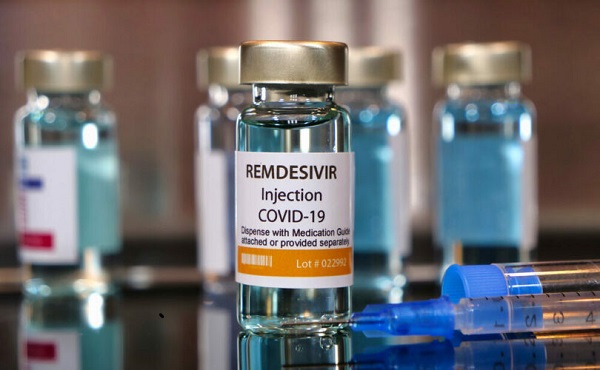COVID-19
Mel Gibson tells Joe Rogan about alternative cancer treatments, dangers of Remdesivir

From LifeSiteNews
By Stephen Kokx
In the wide-ranging interview, Mel Gibson told Joe Rogan about his experience with Remdesivir, the pharmaceutical industry and alternative treatments for cancer.
Mel Gibson discussed a wide range of issues with podcaster Joe Rogan this week, almost all of them eliciting strong reactions on social media, especially his comments on cancer and the medical establishment.
Gibson contracted COVID-19 in April 2020. During a week-long hospital stay, he was administered the dangerous drug Remdesivir, which, despite having been known to have a mortality rate of over 50 percent in trials, was approved by Dr. Anthony Fauci for use in hospitals during the pandemic.
Gibson told Rogan that the experimental treatment nearly ended his life.
“[Remdesivir] kills you. I found that afterward. And that’s why I wonder about Fauci,” Gibson said.
Hospitals were incentivized to use Remdesivir, which has been shown to cause kidney failure, after the U.S. government approved a 20 percent reimbursement bonus for its use. Medical facilities also obtained money from the government for classifying deaths as being due to COVID-19. Critics allege that those policies enticed medical professionals to use the risky treatment in order to kill patients as a way to unethically boost profits.
Gibson told Rogan that he acquired COVID from his gardener, who he had known for twenty years, but that he did not survive his illness.
“We both went to the same hospital, and he died, and I didn’t … I think we both got Remdesivir, which is not good,” he explained.
“I don’t know why Fauci’s still walking around… or at least free,” he further remarked.
Gibson and Rogan also talked about cancer and Big Pharma. Gibson revealed that he knows people who have been healed from the illness due to alternative treatments.
“I have three friends. All three of them had stage 4 cancer. All three of whom don’t have cancer right now at all. And they had some serious stuff going on,” Gibson said.
“And what did they take?” Rogan asked.
“They took …what you’ve heard they’ve taken,” he replied.
“Ivermectin, Fenbendazole,” Rogan said. “I’m hearing that a lot.”
“They drank hydrochloride something or other … people drinking methylene blue,” Gibson said.
“There’s a lot of stuff that does work, which is very strange,” Rogan remarked. “Because, again, it’s profit, when you hear about things that are demonized and they turn out to be effective, you always wonder: ‘what is going on here?’ How is [sic] our medical institutions, how have they failed us so that things that do cure you are not promoted because they’re not profitable? They can’t control it. They don’t have a patent on it. Whether it’s Vitamin D, K2, Magnesium, Zinc. I do all that stuff.”
On Friday morning, an X-approved post titled “Mel Gibson’s Cancer Cure Claim Sparks Medical Debate” was published on the trending section. Some users piggybacked on Gibson’s remarks by stating that they too have used or know people who are using treatments similar to the ones Gibson’s friends did and that “cancer research” is a racket.
Others were unconvinced and re-iterated the media narrative that ivermectin is a simply a “dewormer.”
Elsewhere in their conversation, Gibson defended the authenticity of the Shroud of Turin and the historical reality of the resurrection of Christ, a topic Rogan has seemingly taken a heightened interest in recently given that he discussed the matter in depth on his show with a Protestant guest less than two weeks ago.
COVID-19
Major new studies link COVID shots to kidney disease, respiratory problems

From LifeSiteNews
Receiving four or more COVID shots was associated with 559% higher likelihood of cold in children, a new study found, and another one linked the shots to higher risk of renal dysfunction.
Two major new studies have been published sounding the alarm about the COVID-19 shots potentially carrying risks of not only respiratory diseases but even kidney injury.
The Washington Stand first drew attention to the studies, published in the International Journal of Infectious Diseases (IJID) and International Journal of Medical Science (IJMS), respectively.
The first examined insurance claims and vaccination records for the entire population of South Korea, filtering out cases of infection prior to the start of the outbreak for a pool of more than 39 million people. It reported that the COVID shots correlated with mixed impacts on other respiratory conditions. A “temporary decline followed by a resurgence of URI [upper respiratory infections] and common cold was observed during and after the COVID-19 pandemic,” it concluded. “In the Post-pandemic period (January 2023–September 2024), the risk of URI and common cold increased with higher COVID-19 vaccine doses,” it noted.
Children in particular, who are known to face the lowest risk from COVID itself, had dramatically higher odds of adverse events the more shots they took. Receiving four or more was associated with 559% higher likelihood of cold, 91% higher likelihood of pneumonia, 83% higher likelihood of URI, and 35% higher likelihood of tuberculosis.
The second study examined records of 2.9 million American adults, half of whom received at least one COVID shot and half of whom did not.
“COVID-19 vaccination was associated with a higher risk of subsequent renal dysfunction, including AKI [acute kidney injury] and dialysis treatment,” it found, citing 15,809 cases versus 11,081. “The cumulative incidence of renal dysfunction was significantly higher in vaccinated than in unvaccinated patients […] At the one-year follow-up, the number of deaths among vaccinated individuals was 7,693, while the number of deaths among unvaccinated individuals was 7,364.” Notably, the study did not find a difference in the “type of COVID-19 vaccine administered.”
The researchers note that this is not simply a matter of correlation, but that a causal mechanism for such results has already been indicated.
“Prior studies have indicated that COVID-19 vaccines can damage several tissues,” they explain.
“The main pathophysiological mechanism of COVID-19 vaccine-related complications involve vascular disruption. COVID-19 vaccination can induce inflammation through interleukins and the nod-like receptor family pyrin domain-containing 3, an inflammatory biomarker. In another study, thrombosis episodes were observed in patients who received different COVID-19 vaccines. Additionally, mRNA COVID-19 vaccines have been associated with the development of myocarditis and related complications […] The development of renal dysfunction can be affected by several biochemical factors [26]. In turn, AKI can increase systemic inflammation and impair the vasculature and red blood cell aggregation. Given that the mechanism underlying COVID-19 vaccine-related complications corresponds to the pathophysiology of kidney disease, we hypothesized that COVID-19 vaccination may cause renal dysfunction, which was supported by the results of this study.”
Launched in the final year of President Donald Trump’s first term in response to COVID-19, Operation Warp Speed (OWS) had the COVID shots ready for use in a fraction of the time any previous vaccine had ever been developed and tested. As LifeSiteNews has extensively covered, a body of evidence steadily accumulated over the following years that they failed to prevent transmission and, more importantly, carried severe risks of their own. COVID was a sticking point for many in Trump’s base, yet he doggedly refused to disavow OWS.
Since leaving office, Trump repeatedly promoted the shots as “one of the greatest achievements of mankind.” The negative reception to such comments got him to drop the subject for a while, but in July 2022, he complained that “we did so much in terms of therapeutics and a word that I’m not allowed to mention. But I’m still proud of that word, because we did that in nine months, and it was supposed to take five years to 12 years. Nobody else could have done it. But I’m not mentioning it in front of my people.”
So far, Trump’s second administration has rolled back several recommendations for the shots but not yet pulled them from the market, despite hiring several vocal critics of the COVID establishment and putting the Department of Health & Human Services under the leadership of America’s most prominent anti-vaccine activist, Robert F. Kennedy Jr. Most recently, the administration has settled on leaving the current vaccines optional but not supporting work to develop successors.
In early August, Kennedy announced the government would be “winding down” almost $500 million worth of mRNA vaccine projects and rejecting future exploration of the technology in favor of more conventional vaccines. Last week, HHS revoked emergency use authorizations (EUA) for the COVID shots, which were used to justify the long-since-rescinded mandates and sidestep other procedural hurdles, and in its place issued “marketing authorization” for those who meet a minimum risk threshold for the following mRNA vaccines: Moderna (6+ months), Pfizer (5+), and Novavax (12+).
“These vaccines are available for all patients who choose them after consulting with their doctors,” Kennedy said, making good on his pledge to “end COVID vaccine mandates, keep vaccines available to people who want them, especially the vulnerable, demand placebo-controlled trials from companies,” and “end the emergency.”
COVID-19
Spy Agencies Cozied Up To Wuhan Virologist Before Lying About Pandemic


From the Daily Caller News Foundation
By Emily Kopp
The Office of the Director of National Intelligence’s (ODNI) hub for foreign biological threats dismissed the intelligence pointing to a lab accident in Wuhan as “misinformation” in January 2021, two former government sources who requested anonymity to discuss sensitive internal meetings told the Daily Caller News Foundation. New documents show that intelligence risked implicating ODNI’s own bioengineering advisor — University of North Carolina professor Ralph Baric.
Baric, who engineered novel coronaviruses with the Wuhan Institute of Virology (WIV), advised ODNI four times a year on biological threats, according to documents released Oct. 30 by Kentucky Sen. Rand Paul.
Dear Readers:
As a nonprofit, we are dependent on the generosity of our readers. \
Please consider making a small donation of any amount here.
Thank you!
Baric did not respond to the DCNF’s requests for comment.
The professor’s ties to American intelligence may run even deeper, the documents reveal, as ODNI facilitated a meeting between the CIA and Baric about a project on coronaviruses in September 2015.
The email exchange with the subject line “Request for Your Expertise” shows an unnamed government official with a CIA-affiliated email address pitching a “possible project” to Baric relating to “[c]oronavirus evolution and possible natural human adaptation.”
The new documents shed a bit of light on a question members of Congress have posed for years: Whether our own intelligence agencies knew more about the likelihood of a lab origin of COVID than they told the public.
“Director Ratcliffe has been on the forefront of this issue since the start of the COVID-19 pandemic and has been committed to transparency and accountability on this issue,” a CIA spokesperson said in a statement. “In January – as one of the Director’s first actions at Langley – CIA made public its assessment that a research-related origin of the COVID-19 pandemic is more likely than a natural origin. CIA will continue to evaluate any available credible new intelligence reporting as appropriate.”
Paul is seeking more documents from ODNI on potential ties between U.S. intelligence and the research in Wuhan as part of an ongoing investigation by the Senate Committee on Homeland Security and Governmental Affairs and has promised public hearings in the coming months.
Director of National Intelligence (DNI) Tulsi Gabbard disbanded the ODNI biological threats office earlier this year following questions from the DCNF about its suppression of COVID origins intelligence in August. Gabbard and a dedicated working group have also been quietly investigating the origins of COVID.
Protecting Their Own

Baric gave a presentation to the ODNI in January 2020 showing that he advised American intelligence that COVID may have emerged from a lab, the documents also indicate. Baric shared that the WIV had sequenced thousands of SARS-like coronaviruses, including strains capable of epidemics, the slides show.

Baric noted that the Wuhan lab does this work under low biosafety levels despite the ability of some of these viruses to infect and grow in human lung cells.
What Baric omitted: He had submitted a grant application in 2018 with intentions to conduct research to make coronaviruses with the same rare features seen in COVID while concealing the Wuhan lab’s low biosafety level, jotting in the margins of a draft of the grant application that Americans would “freak out” if they knew about the shoddy standards.
One year after Baric’s presentation, ODNI had hardened against the lab leak hypothesis.
When State Department officials pushed to declassify certain intelligence related to a plausible lab leak in January 2021, the ODNI expressed concerns that it would “call out actions that we ourselves are doing.”
Former ODNI National Counterproliferation and Biosecurity Center (NCBC) Director Kathryn Brinsfield, a medical doctor, also dismissed a January 2021 presentation by government officials about a plausible lab origin of COVID as “misinformation,” two sources told the DCNF. Her top aide Zach Bernstein, who possesses a master’s degree in security studies but no scientific credentials, also dismissed the presentation, according to three sources.
Gabbard disbanded NCBC in August following questions from the DCNF about its role in suppressing COVID origins intelligence.
But in the years preceding Gabbard’s takeover of the intelligence community’s central office, the ODNI’s public reports omitted any analysis of COVID’s viral genome. One intelligence agency filed a formal complaint about this glaring omission, the DCNF reported.
Scientists often received fierce pushback from former National Intelligence Council official Adrienne Keen, who helped steward former President Joe Biden’s 90-day review into COVID’s origins, an official told the DCNF. Paul’s request for records from ODNI includes a request for some of Keen’s communications.
Brinsfield and Keen did not respond to requests for comment.
Unanswered Questions
Despite the new disclosures, the precise nature of the CIA’s interest in Baric’s coronavirus work remains unknown. The documents do not include any further details about the work that the CIA and Baric may or may not have undertaken.
The U.S. Agency for International Development (USAID) funded the discovery of novel coronaviruses and shipped the samples to Wuhan through a 2009-2020 program called PREDICT, the DCNF reported in July. USAID sometimes acted as a CIA front before Trump dismantled it earlier this year — but no evidence exists that the CIA directed PREDICT.
An unnamed FBI special agent was in communication with Baric about responding to public requests for his research and emails with the Wuhan lab through the North Carolina Freedom of Information Act, according to a 2024 congressional letter, but details about the contact between the FBI and Baric also remain uncertain.
The CIA was slow to acknowledge that a lab was the pandemic’s most likely source, an assessment that the CIA made public more than five years after the pandemic emerged and well after the FBI and the Department of Energy.
In early 2020, when Trump’s Deputy National Security Advisor Matt Pottinger tasked CIA analysts to dig into the matter, they came up empty, according to a New York Times report. Instead, anonymous sources smeared Pottinger as having a “conspiratorial view” of the Chinese Communist Party.
Trump’s current CIA Director John Ratcliffe, who served as the DNI from May 2020 to January 2021, revealed in a 2023 Wall Street Journal op-ed that he had pushed for the declassification of COVID origins intelligence as the DNI but that he “faced constant opposition, particularly from Langley.”
-

 National2 days ago
National2 days agoConservative bill would increase penalties for attacks on places of worship in Canada
-

 Frontier Centre for Public Policy1 day ago
Frontier Centre for Public Policy1 day agoRichmond Mayor Warns Property Owners That The Cowichan Case Puts Their Titles At Risk
-

 armed forces2 days ago
armed forces2 days agoCanadian veteran says she knows at least 20 service members who were offered euthanasia
-

 Alberta2 days ago
Alberta2 days agoHow economic corridors could shape a stronger Canadian future
-

 Business1 day ago
Business1 day agoMark Carney Seeks to Replace Fiscal Watchdog with Loyal Lapdog
-

 Business2 days ago
Business2 days agoSluggish homebuilding will have far-reaching effects on Canada’s economy
-

 COVID-191 day ago
COVID-191 day agoMajor new studies link COVID shots to kidney disease, respiratory problems
-

 Daily Caller2 days ago
Daily Caller2 days agoLaura Ingraham’s Viral Clash With Trump Prompts Her To Tell Real Reasons China Sends Students To US







